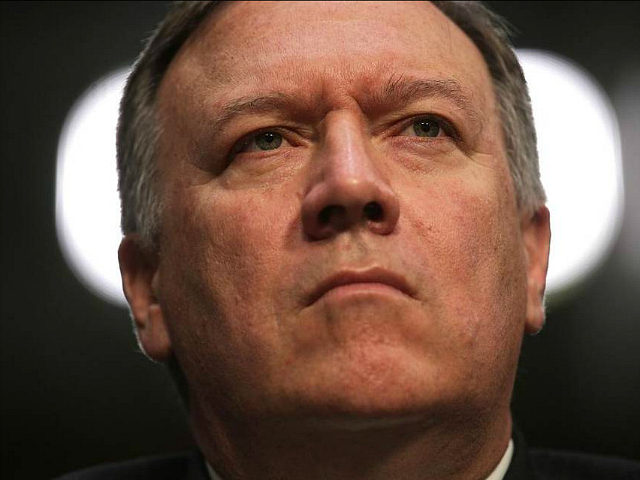The United States will do “everything” in its power to eliminate Pakistan-based safe havens for jihadist groups in neighboring Afghanistan if Islamabad fails to take action, warned CIA Director Mike Pompeo this weekend.
“In the absence of the Pakistanis achieving that, we are going to do everything we can to make sure that that safe haven no longer exists,” declared the CIA chief during the Reagan National Defense Forum in California on Saturday as U.S. Defense Secretary James Mattis was preparing to travel to Pakistan:
On Sunday, Secretary Mattis told reporters he was not planning to “prod” Islamabad into eliminating terrorist sanctuaries within its borders because he expected Pakistan to abide by its promises to combat jihadists in the region.
“That’s not the way I deal with issues,” said the Pentagon chief when asked if he was going to “prod” Pakistan to take action. “I believe that we work hard on finding the common ground, and then we work together, so that’s the approach I want to take.”
However, when asked how the U.S. would convince Pakistan to adhere to President Donald Trump’s new Afghan strategy, the CIA director sent a tougher message, saying the U.S. would take action if Islamabad refuses to do so.
“You begin by seeking their assistance,” added Pompeo, noting that Secretary Mattis’s trip to Pakistan is aimed at making “clear the president’s intent” and “will deliver the message that we would love you to do that and that the safe haven inside of Pakistan has worked to the detriment of our capacity to do what we needed to do in Afghanistan.”
When announcing his new Afghanistan strategy in August, Trump described the need to pressure Pakistan into no longer harboring terrorist groups as a significant component of his plan, warning Islamabad it “has much to lose by harboring criminals and terrorists.”
In response, Pakistan rebuked Donald Trump for admonishing Islamabad for its affiliation with jihadist organizations.
Marking the first 100 days last week following Trump’s Afghanistan strategy announcement in August, American Gen. John Nicholson, the top commander of U.S. and NATO forces in Afghanistan, told reporters that Pakistan has failed to change its relationship with jihadist groups operating on its soil.
“We’ve been very direct and very clear with the Pakistanis. … So the expectations are out there. Now, we have not seen those changes implemented yet,” he said, suggesting that Islamabad continues to shelter terrorists.
Echoing Nicholson, the CIA Director also said Saturday that Pakistan has “not” changed its behavior “yet.”
On Sunday, Secretary Mattis conceded that persuading Pakistan into cutting ties with jihadist groups fighting U.S. troops and their allies in Afghanistan would present a difficult task.
Asked to explain why he thinks the Trump administration can succeed when all its predecessors have failed to change Pakistan’s behavior, the defense secretary responded:
I wouldn’t characterize everything over the past 16 years as failures. There is clearly an abundance of areas where we have to double down, and I am optimistic at this point that because of what our adversaries, our mutual enemies are doing, that we can find ways to work together.
He explained that by “doubling down,” he meant “working together.”
According to Nicholson, the Afghanistan-Pakistan region is home to the “highest concentration” of terrorist groups (20 of 98) in the world.
In its latest assessment of the ongoing war in Afghanistan, the Pentagon noted:
The Afghanistan-Pakistan border region remains a sanctuary for various groups, including al Qaeda, al Qaeda in the Indian Subcontinent (AQIS), the Haqqani Network, Lashkar-e- Tayyiba, Tehrik-e-Taliban Pakistan (TTP), ISIS-K [Islamic State], and the Islamic Movement of Uzbekistan. Sanctuary on the Pakistan side and presence on the Afghan side remain a security challenge for both countries and pose a threat to regional security and stability.
Afghanistan and Pakistan have long accused each other of sheltering terrorist groups.
“The Pakistanis have many concerns about the border from their side,” acknowledged Gen. Nicholson last week. “We also share those concerns. And so, there are some common equities we have: obviously counterterrorism, border control, refugee returns. All these issues are on the table.”
Leon Panetta, who served as both CIA director and defense secretary under former President Barack Obama, also described Pakistan as a thorn in the side of U.S. efforts to combat jihadist groups in the region.
“I hope that Mike [Pompeo] and Jim Mattis are successful in making clear to the Pakistanis that got to be able to see a little broader and they have to go after terrorists within their own territory. Unless that happens, we are going to continue to have problems in Afghanistan,” he said.

COMMENTS
Please let us know if you're having issues with commenting.